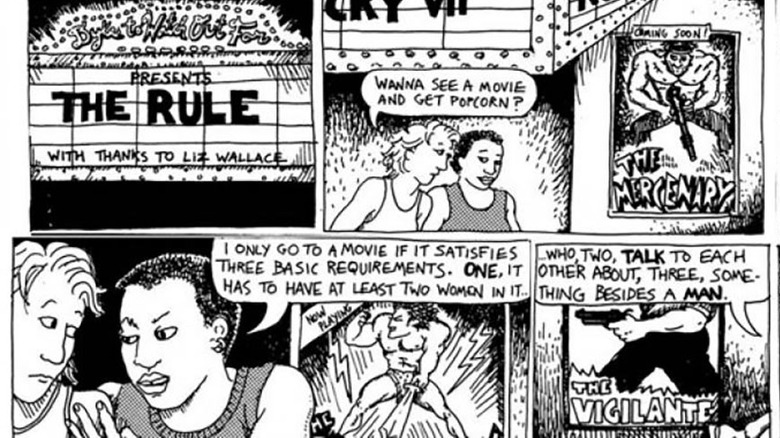No, Not Every Movie Needs To Pass The Bechdel Test
In 2019, Twitter user @MapleCocaine tweeted out an innocuous statement that would become one of Twitter's core axioms: "Each day on twitter there is one main character. The goal is to never be it." Usually the wearer of the main character crown has either said something so out of pocket that anyone with more than two brain cells can see that "the best time to delete the tweet was immediately after sending it, the second best time is now," or someone who makes a statement so bafflingly offensive with an unfounded sense of confidence, we're shocked to discover the tweeter wasn't just two junior high boys in a trenchcoat pretending to be an adult behind a keyboard.
Yesterday's Twitter main character was Hanna Rosin, a novelist and editorial director for audio for New York Magazine. After watching the delightful gay rom-com "Fire Island" on Hulu, Rosin criticized the film about gay men for its *checks notes* inability to pass the Bechdel Test.
For those unaware, The Bechdel-Wallace (commonly just Bechdel) Test is a cinematic measuring tool of the depiction of women in fiction. The test has only three rules: (1) that at least two women are featured, (2) that these women talk to each other, and (3) that they discuss something other than a man. "The Test" first appeared in Alison Bechdel's 1985 comic strip "Dykes to Watch Out For," based on conversations Bechdel had with her friend Liz Wallace, as well as the works of Virginia Woolf. It is also a tool that has been willfully misunderstood and weaponized over its nearly 40-year existence, and yesterday was no different.
The perfect imperfection of The Bechdel-Wallace Test
The Bechdel-Wallace Test is not meant to be treated as the be-all, end-all of feminist theory, but a bare minimum measurement of media produced for mass audience appeal. The Bechdel-Wallace Test is imperfect by design, because it allows something like the objectifying male fantasy "Weird Science" a passing score, while a film with inarguable feminist characters like "Jackie Brown," "Gravity," or "Before Sunrise," fail.
The Bechdel-Wallace Test was not designed to be a definitive metric, it was a punchline in a comic strip that points out how frequently Hollywood blockbusters fail their female characters. Unfortunately, plenty of people have somehow convinced themselves that The Bechdel-Wallace Test is the only qualifier as to whether or not a movie is "good," completely ignoring any of the nuance, context, or intention of the stories being told.
In a now deleted (but screenshotted to hell and back) tweet, Rosin applied the test to "Fire Island," stating that the film receives "an F-," failing the test "in a whole new way." While Rosin could have stopped there and gotten plenty of eye rolls, she went a step further by saying, "Do we just ignore the drab lesbian stereotypes bc cute gay Asian boys? Is this revenge for all those years of the gay boy best friend?" Disregarding the fact the Bechdel-Wallace Test is pass/fail and the utter disrespect to refer to the ICONIC Margaret Cho as performing "drab lesbian stereotypes," the tweet was a perfect showcase of how beyond misunderstood the Bechdel-Wallace Test has become.
Not every story needs to prioritize women
"Fire Island" was written by Joel Kim Booster and directed by Andrew Ahn, and is a modern, gay, retelling of Jane Austen's "Pride & Prejudice" starring gay Asian American men. It is true, yes, that Hollywood has a problem with showcasing women in complex, interesting roles, but do you know who else Hollywood has a problem with showcasing in complex, interesting roles? Literally anyone that isn't a cisgender, straight, white man.
"Fire Island" is a film that celebrates queer, Asian American joy, and showcases a community of men that are often regulated to secondary characters or offensive stereotypes. This is a film about specific experiences, not the whole of the LGBTQIA+ community. This means it is not the responsibility of "Fire Island," Joel Kim Booster, Andrew Ahn, or anyone else who worked on the film to pass the Bechdel-Wallace Test, because this movie isn't telling a story that would elicit the need to pass the test.
A film like "Fire Island" shouldn't be held to the same standard as something like the Bechdel-Wallace failing "The Avengers," because the film wasn't made with the intention of appealing to universal audiences or trying to tell a story that could speak to society as a whole. Getting pissy about "Fire Island" failing the Bechdel-Wallace test is the cinematic equivalent of judging a fish by its ability to ride a bicycle. It's also impossible to ignore that Rosin's ire was directed at a film providing seldom-seen representation of a marginalized community, and not calling something out something like "Top Gun: Maverick," which also doesn't pass the test.
The world has changed since the Bechdel-Wallace Test was created
When The Bechdel-Wallace Test first appeared in 1985, the world was an entirely different place. American supervillain Ronald Reagan was president, for crying out loud, and we're still trying to undo the fallout of his destruction of American progress. The simplistic test was a reflection on the very narrow perspective of women's representation in cinema, not taking into account a multitude of factors that influence whether or not a film would, could, or should pass the test. The test is a reflection of the outdated social norms of the 1980s, and has not evolved to encompass the broader scope, mainly because it was a joke in a comic strip and not some groundbreaking philosophical theory based on heavily researched data.
Okay, I just added a corollary to the Bechdel test: Two men talking to each other about the female protagonist of an Alice Munro story in a screenplay structured on a Jane Austen novel = pass. #FireIsland #BechdelTest
— Alison Bechdel (@AlisonBechdel) June 8, 2022
Understandably, Rosin was ratioed beyond her wildest dreams and Alison Bechdel even took to Twitter to praise "Fire Island," poking fun at the ridiculousness of holding the film to The Test's standards. For what it's worth, Rosin did post an apology on Twitter, but it's no one other than the impacted party's place to determine whether or not the apology is accepted and if the harm has been rightfully repaired.
Regardless, the fact the Bechdel-Wallace has become the "gold standard" of film criticism in many "progressive" circles is a complete misuse of the test's existence, and a fundamental misunderstanding of what determines a film's quality. The next time someone dismisses a film because "it doesn't pass the Bechdel Test," that should be a sign to interrogate why the film doesn't pass, because if it's anything like "Fire Island," it's an intentional decision worthy of praise.



